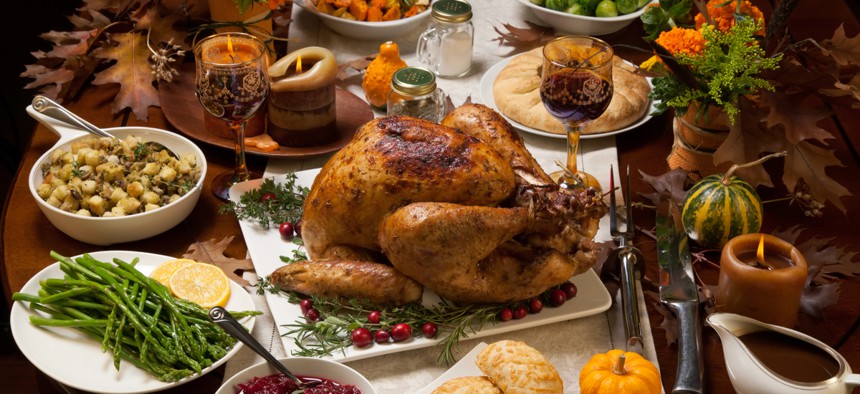Traditional Thanksgivings Off the Table As Coronavirus Surges

Public health officials are warning people not to host large Thanksgiving gatherings this year. Shutterstock
As evidence grows that small gatherings are a driver of the current coronavirus surge, a growing chorus of mayors, governors, and public health officials urge people to skip the big meal with their extended family.
Thanksgiving will have to look different during the pandemic. With cases spiking almost universally across the country and a growing number of hospital systems approaching their maximum capacity levels, state and local officials are urging people not to host traditional Thanksgiving dinners with lots of family members.
In Chicago, where hospitals are bracing for the biggest surge in cases yet, Mayor Lori Lightfoot this week told residents that they “must cancel the normal Thanksgiving plans…particularly if they include guests that do not live in your immediate household." Illinois Gov. J.B. Pritzker echoed her calls and said that “we all need to celebrate a bit differently” this year.
Officials in Illinois are part of a growing chorus of state and local officials who are pleading with people not to host gatherings or travel for the holiday. The governors of Michigan, Wisconsin, and Ohio all urged residents to only eat with family they already live with. Nebraska Gov. Pete Ricketts said to try to gather outside if the weather allows and only in “very small groups.” Mayors and public health authorities in Los Angeles and New York expressed concerns about the growing number of coronavirus cases and hospitalizations and said Thanksgiving could become a grim milestone in the pandemic if people don’t follow public health guidelines.
National public health experts have issued a similar message, with Dr. Anthony Fauci, the nation’s top infectious disease expert, encouraging people not to invite their vulnerable family members to gatherings. Dr. Celine Gounder, a member of President-elect Joe Biden’s Covid-19 advisory board, compared traveling and spending time with people over the holidays to “pouring gasoline on a fire.”
The warnings are driven by new public health data that shows small indoor gatherings are one of the main causes of the current wave of coronavirus cases.
Early in the pandemic, case spikes were often driven by virus outbreaks at places where people were densely packed in close quarters—like nursing homes, correctional facilities, and meatpacking plants. Many states and cities then tried to limit the scenarios that would draw large crowds, particularly indoors, establishing capacity restrictions for restaurants and on events like weddings.
Contact tracing efforts now point the finger at much smaller groups. Doctors at the Children’s Hospital of Philadelphia Policy Lab wrote in a recent blog post that “we know now that limited restaurant or gym occupancy, or even the operation of hair salons, are not driving this current resurgence.”
“Rather, we are increasingly observing this fall that transmission is happening in small gatherings … among family and friends in their homes,” the doctors wrote. “As the weather becomes colder, these gatherings are taking place indoors, often in the absence of strict mask use, creating the perfect conditions for a virus that can spread among people who are crowded into a poorly ventilated space.”
These small gatherings, they concluded, are the result of “pandemic fatigue” and “mixed messages from political leaders” on the value of masks and social distancing.
As Thanksgiving approaches, state and local leaders are trying to make their messaging clearer, with some leading by example. Maryland Gov. Larry Hogan said this week that “family gatherings are the most dangerous thing that we have, according to our contact tracing,” and that he would be “taking [his] own advice” regarding Thanksgiving. The Republican plans to have dinner with his wife, forsaking the typical holiday celebrations that would include his children and grandchildren.
Others officials are offering more specific guidance. Washington Gov. Jay Inslee said that Thanksgiving gatherings should happen only if everyone invited quarantines for 14 days prior, meaning starting on November 12. Nashville Mayor John Cooper said that anyone attending a gathering with people outside their immediate household should bring their own food and that all guests should use disposable utensils and plates.
In Kentucky, one of several states that is limiting indoor gatherings to ten people, the Department of Public Health released recommendations for “fun alternatives” to traditional Thanksgiving, including hosting a virtual dinner or preparing family recipes for neighbors, especially those at high risk of complications from Covid, and delivering them in a way “that doesn’t involve contact with others.”
New York is another state to limit holiday festivities to ten people or fewer—a move that is facing pushback from some local officials. City Councilmember Joe Borelli, a Republican representing Staten Island, tweeted that he’d be hosting more than ten people at his house on Thanksgiving. “Some family will come from (gasp!) New Jersey,” he wrote. “Kids will see their grandparents, cousins will play in the yard, sis in law will bring strawberry rhubarb pie, & a turkey will be overcooked.”
His remarks were swiftly condemned by his Democratic colleagues. Councilmember Keith Powers tweeted that Borelli should “take the uptick of the virus seriously” and “act like we’re in a pandemic.” Councilmember Brad Lander tweeted that “overcooked turkey…[is] par for the course.”
“But public leadership that gleefully ignores public health evidence & models behavior that will get people killed? Not how we’ll be giving thanks this year.”
Emma Coleman is the assistant editor for Route Fifty.
NEXT STORY: The Enraging Deja Vu of a Third Coronavirus Wave






